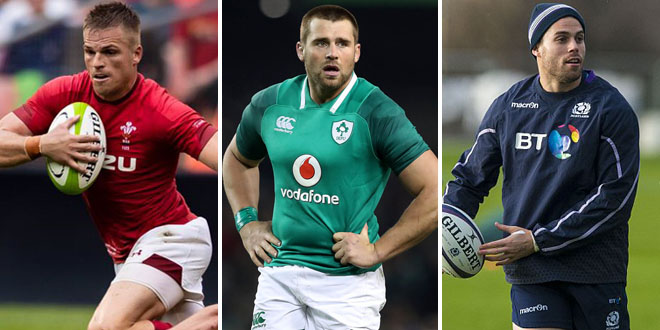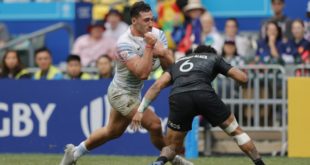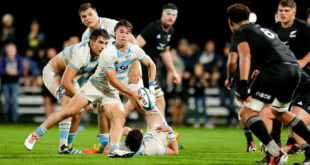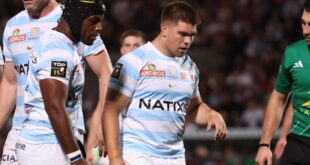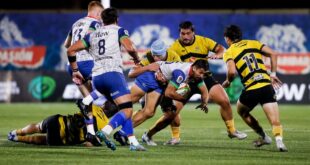In May 2017 World Rugby changed player eligibility, making it much harder for a player to qualify via residency. In no small part was the change of extending residency laws from three years to five a response to the share number of foreign-born players to have played Six Nations rugby in the years preceding and following RWC 2015.
The eligibility laws were a source of extreme controversy in 2018. Belgium, Romania, Spain, and Tahiti were all booted from RWC 2019 qualifiers for fielding players who were either (a) unknowingly captured by another as was the case regarding Romania and Spain, or (b) genuinely not eligible to begin with in the cases of Belgium and Tahiti. It took a controversial refereeing appointment from Rugby Europe of Romanian Vlad Iordachescu to begin what was a long and revealing saga.
Ultimately Russia took Romania’s spot in the 2019 World Cup. The Oaks had already been photographed as a team with the RWC 2019 banner and were confirmed as facing Japan in the tournament opener. Investigations into the appointment and performance of Iordachescu changed everything. Center Sione Faka’osilea was confirmed as being captured by Tonga, making him permanently ineligible for Romania.
Due to their respective involvement with France age grade sides in matches against Wales, Spanish players Mathieu Bélie and Bastien Fuster were deemed to be captured by France. The outcome saw Los Leones being disqualified from qualifying with Germany becoming Europe 2 and facing Samoa in the RWC Play-Off Final series.
The complexity of World Rugby Regulation 8 saw Bélie and Fuster captured by playing for one ‘next senior XV’ against another. Had they not played against Wales u20 they would never have been captured under World Rugby eligibility laws. The process was concluded by World Rugby on June 6, 2018. Three days later saw the beginning of the June 2018 Internationals. It saw 37 players with World Rugby u20 experience representing a different country at senior level. The complete list can be seen by clicking here.
The policy which saw Bélie and Fuster captured no longer exists. Beginning on January 1, 2018, countries can no longer nominate their u20 side as their ‘next senior XV’. As noted from the decision to expel Spain from RWC 2019 qualifiers it cannot be retroactively applied.
For a look at the Foreign Born Players in the 2018 Six Nations tournament click here. Americas Rugby News has also documented players in prior tournaments. The 2018 player list can be seen here as can be the 2017 list here. While for a complete look at RWC 2015 click here.
For the 2019 edition a new column is added for all of the six competing unions. It follows that used for the Foreign Born Players in the 2018 Rugby Championship. The column includes other representative duty to document the comparative history of the players.
SCOTLAND (19)
Gregor Townsend’s roster contains more than double that of any other competitor in the Six Nations. Of note is that that over half of the Foreign-Born players qualify via a Grandparent. This very qualification path may not survive should World Rugby adopt additional tightening of eligibility laws.
Of Scotland’s foreign-born contingent there are notable cases including Maori All Black and New Zealand u20 star Sean Maitland; Allan Dell who won the 2012 Junior World Trophy with South Africa; WP Nel who was signed to play for Edinburgh with a view to potential eligibility in time for RWC 2015; and Ben Toolis who played for the ARU Academy in the Pacific Rugby Cup.
| PLAYER | POS | BORN | ELIGIBILITY | OTHER REP. |
| Alex Allan | LH | England | Grandparent | – |
| Allan Dell | LH | South Africa | Grandparent | South Africa u20 |
| Simon Berghan | TH | New Zealand | Grandparent | – |
| WP Nel | TH | South Africa | Residency (2015) | – |
| Sam Skinner | LO | England | Parent | England u20 |
| Tim Swinson | LO | England | Grandparent | – |
| Ben Toolis | LO | Australia | Parent | ARU Academy |
| John Hardie | FL | New Zealand | Grandparent | New Zealand Schools, u19 |
| Hamish Watson | FL | England | Grandparent | |
| Josh Strauss | N8 | South Africa | Residency (2015) | – |
| Ryan Wilson | N8 | England | Grandparent | – |
| Ali Price | SH | England | Parent | – |
| Henry Pyrgos | SH | England | Parent | – |
| Nick Grigg | FH | New Zealand | Grandparent | – |
| Chris Harris | CE | England | Grandparent | England Counties |
| Sam Johnson | CE | Australia | Residency (2018) | Australia Schoolboys |
| Sean Maitland | WI | New Zealand | Grandparent | Maori All Blacks New Zealand Schools, u19, u20 |
| Byron McGuigan | WI | Namibia | Parent | – |
| Tommy Seymour | WI | USA | Parent | Ireland u19 |
ITALY (9)
Conor O’Shea has nine foreign-born players on his roster. They include veteran captain, Sergio Parisse who moved from Argentina to Italy aged 17. Newcomers for the 2019 Six Nations include David Sisi, Cherif Traore, and Jimmy Tuivaiti.
Traore moved to Italy aged seven and played for Italy u20. Sisi played u20 for England and until making his debut for Italy is eligible for Scotland in addition to his native Germany. In total six of the players qualify on residency, a number higher than the other five competing unions.
| PLAYER | POS | BORN | ELIGIBILITY | OTHER REP. |
| Cherif Traore | LH | Guinea | Residency (2004) | – |
| Dean Budd | LO | New Zealand | Residency (2015) | New Zealand u19 |
| David Sisi | LO | Germany | Parent | England u20 |
| Sebastian Negri | FL | Zimbabwe | Parent | – |
| Braam Steyn | FL | South Africa | Residency (2015) | South Africa u20 |
| Sergio Parisse | N8 | Argentina | Parent | – |
| Jimmy Tuivaiti | N8 | New Zealand | Residency (2018) | – |
| Ian McKinley | FH | Ireland | Residency (2017) | Ireland u20 |
| Jayden Hayward | FB | New Zealand | Residency (2017) | – |
WALES (9)
As was the case in 2018, Wales begin the 2019 Six Nations with nine foreign-born players. Of the nine, three – Hallam Amos, Jonathan Davies, and George North – grew up in Wales, having moved there as children. The remaining players were not produced by the Welsh rugby system. Ross Moriarty, who played for England u20, has said he did so knowing he would remain eligible for Wales.
Gareth Anscombe played for New Zealand at u20 level. He and countryman Hadleigh Parkes have been playing together as the Welsh 10-12 combination. Parkes’ case is unique as he debuted for Wales on the same day that he completed his three-year residency requirements.
| PLAYER | POS | BORN | ELIGIBILITY | OTHER REP. |
| Tomas Francis | TH | England | Grandparent | – |
| Jake Ball | LO | England | Parent | – |
| Ross Moriarty | FL | England | Parent | England u18, u20 |
| Gareth Anscombe | FH | New Zealand | Parent | New Zealand u20 |
| Jonathan Davies | CE | England | Parent | – |
| Hadleigh Parkes | CE | New Zealand | Residency (2017) | – |
| Hallam Amos | WI | England | Residency (2004) | – |
| George North | WI | England | Parent | – |
| Jonah Holmes | FB | England | Grandparent | – |
ENGLAND (8)
Eddie Jones’ foreign-born players contain some names with notable histories. Brad Shields was a u20 World Champion with New Zealand and made the roster before playing his first match in England. Another to arrive in England as an adult is Nathan Hughes, a player approached long before being eligible.
In contrast to Hughes, fellow Fijian-born English player Joe Cokanasiga went through the English system. He is a former u20 player who had left Fiji aged three with his family. His father is a member of the British Army. The Vunipolas were born in Australia and New Zealand to Tongan parents. They were raised in Wales before moving to England still as children. Their father, Fe’ao Vunipola, played in RWCs 1995 and 1999 and is a former national captain of Tonga.
| PLAYER | POS | BORN | ELIGIBILITY | OTHER REP. |
| Mako Vunipola | LH | New Zealand | Residency (2008) | – |
| Jack Clifford | FL | Australia | Parent | – |
| Brad Shields | FL | New Zealand | Parent | New Zealand u17, u20 |
| Nathan Hughes | N8 | Fiji | Residency (2016) | Fiji Warriors |
| Billy Vunipola | N8 | Australia | Residency (2008) | – |
| Ben Te’o | CE | New Zealand | Parent | New Zealand u18 (RL) Samoa (RL) |
| Manu Tuilagi | CE | Samoa | Residency (2007) | – |
| Joe Cokanasiga | WI | Fiji | Residency (2003) | – |
IRELAND (7)
Seven of Ireland’s roster are foreign-born. Of them three gained eligibility after arriving as adults on professional rugby contracts – Quinn Roux, CJ Stander, and Bundee Aki. Stander captained the Baby Boks. Of the remaining four, three were born abroad but raised in Ireland.
The exception is Will Addison who was a u20 Six Nations Champion with England and lost against Ireland in the 2012 Junior World Championship. Also on the roster is Rhys Ruddock who is Irish born but was raised in Wales.
| PLAYER | POS | BORN | ELIGIBILITY | OTHER REP. |
| Ultan Dillane | LO | France | Parent | – |
| Quinn Roux | LO | South Africa | Residency (2015) | – |
| Jordi Murphy | FL | Spain | Parent | – |
| CJ Stander | N8 | South Africa | Residency (2016) | South Africa u18, u20 |
| Joey Carbery | FH | New Zealand | Parent | – |
| Bundee Aki | CE | New Zealand | Residency (2017) | – |
| Will Addison | FB | England | Parent | England u20 |
FRANCE (3)
With three foreign-born players France has the lowest of the rosters named from the Six Nations unions. France also has a different requirement as in order to play for Les Bleus players must carry a French passport. This has seen Alivereti Raka and Paul Willemse acquiring one to gain eligibility.
Willemse is France’s one newcomer from abroad for the 2019 Six Nations. He is a former South Africa u20 player while Uini Atonio played for Samoa u20 despite being born and raised in Timaru, New Zealand. Lock Sébastien Vaha’amahina was born in New Caledonia, a French territory in the South Pacific that could well become independent in the relatively near future.
| PLAYER | POS | BORN | ELIGIBILITY | OTHER REP. |
| Dany Priso | LH | Cameroon | Residency (2008) | – |
| Uini Atonio | TH | New Zealand | Residency (2014) | Samoa u20 |
| Paul Willemse | LO | South Africa | Residency (2018) | South Africa u20 |
 Americas Rugby News Rugby news from across the Americas!
Americas Rugby News Rugby news from across the Americas!
